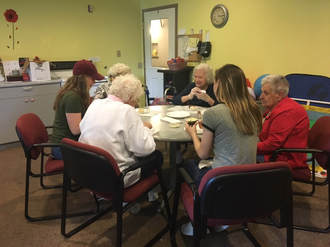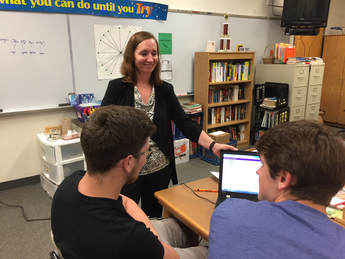Blog post by Dr. Joe Harmon, PTAC Member Students decorating cupcakes with residents of the local assisted living center Students decorating cupcakes with residents of the local assisted living center Due to lack of opportunity, youth in rural areas of America are not as civically engaged as their suburban and urban peers. I feel the burden of this conclusion by Kawashima-Ginsberg and Sullivan in their study published in The Conversation. They further dubbed rural areas of America “civic deserts.” The youth in these areas are less likely to be involved in civic opportunities or volunteering. We cannot have a thriving democracy without civic engagement from all parts of our country. I am an 8th grade civics in rural Pennsylvania. The responsibility to engage my students in civic action weighs on me daily. Last summer I was introduced to the work of Dr. Peter Levine from the Center for Information and Research on Civic Learning and Engagement (CIRCLE). In one of his talks, he asked a simple question. “What should we do?” These four words have become a driving force and a mantra for my teaching. Something needs to be done, and teachers like me have the opportunity to help our students see the importance of involvement. I am committed to ensuring that my students turn our little part of rural Pennsylvania into an oasis of civic engagement. Last fall I launched a new civic engagement project. Students researched and brainstormed issues of importance at local, state, national, and global levels. Issues such as poverty, terrorism, bullying, and environmental concerns were listed by students. I challenged them to identify how issues such as these could be addressed at the various levels. Then, I asked them to develop a plan of action and a pitch to their classmates to convince others to get involved in addressing their issue. They were figuring out their own, “What should we do?” My goal was for students to take action on an issue of choice and see themselves of agents of change despite their age. You don’t need to be an adult to have a positive impact on your community. Students were asked to carry out at least two acts of civic engagement based on their plans - once in the fall semester, and once in the spring. The impact that my students had was astounding. The local bike trail was scoured for litter several times, while a nearby roadway was cleared of 500 lbs of trash. Students volunteered with their churches, packing blessing bags for underprivileged students. They built refugee gardens in an urban neighborhood. Many volunteered with organizations such as the nearby animal shelter and the community food pantry. There were collection drives for the local cancer center, a toy drive for community children in need, and a plastic bag drive to create mats for those living homeless. Students attended borough council meetings and school board meetings. They wrote letters to the President of the United States about national affairs and to their high school principal in hopes of changing the dress code policy. When it snowed students walked their neighborhood to shovel the driveways of elderly community members. Two projects were especially impactful. One group of students helped revitalize a blighted cemetery that held the remains of several Civil War veterans. Their work was featured by a local news outlet. Another group developed a districtwide Twitter hashtag (#weareredbankvalley), which was used to build school culture and raise hundreds of dollars to benefit their 8th grade class. At the conclusion of the project students blogged about their experience, reflecting on these questions:
One of the most important aspects of this project for me, as a teacher, was to develop intrinsic motivation in my students as civic activists. For this reason, I was careful not to assign extra credit or bonus points to their project. In order to recognize the efforts of those who were interested in going beyond the project’s scope, I allowed those who participated in more than the required number of actions the opportunity to opt out of a civic issues paper that is normally required in my class. Many students chose this path of extra civic participation despite the fact that no points or grade were attached. As I have reflected on my original goal of increasing civic engagement in our rural area and how to improve this project in the future, I have come to the conclusion that student input is key. Even though they are on summer break, many of those who have worked so hard this year to make their community a better place have been eager to provide advice on helping next year’s class. We still have a long way to go in helping our rural students have the same opportunities for civic engagement as their suburban and urban peers. I hope that the work of my students shows that when given that opportunity, students in rural areas can change their world for the better.
2 Comments
Blog Post by Colleen Connors, PTAC Member Colleen teaching in her classroom. Colleen teaching in her classroom. Forty years after they last came together as a group, my uncle’s students gathered to pay their respects at his viewing. They had seen his obituary in the newspaper. It read, “Donald B. Veix, 85 years young, beloved husband for 61 years, served in the US Army, discovered his passion for teaching, and shared his love for literature.” It was that love which my uncle shared that compelled his former students to contact each other, march into the funeral parlor as a group to pay their last respects, and share their stories with the family. Many shared that that they did not like school and that they had considered dropping out of school until they took my Uncle’s class. His passion for teaching and love of learning became the reason they went to school every day. After the funeral, my cousin turned to me wearing a sad expression. “Look at me! I’m just a businessman. What kind of impression do I make? Who is going to remember me?” Like many of us in attendance that day, my cousin was moved by the lasting impact of my uncle’s passion for teaching and love for his students, even decades after he left the classroom. My uncle was always approachable, had a great sense of humor, and used every tool at his disposal to reach his students. Forty years later they recalled how he incorporated art, music, history, and theater into his lessons. What other profession has this kind of impact? A teacher can touch lives and leave lasting memories, but increasingly too many teachers are paying a toll that seems to outweigh the benefits. We are losing teachers at alarming rates. Many areas in our Commonwealth and across the country are facing teacher shortages. Too many high school students refuse to even consider the profession, and many veteran teachers are worn out. A couple of years ago, I received an email from a former student which read: ”I have always seen myself going into the field of education, and because of that, I have been discouraged by others. Everyone says there are no jobs and the pay isn't enough, which is probably true. I look at people like you though, and see that there are many other valid reasons to teach. I could be wrong, but I'd like to believe that you teach because you enjoy seeing us grow. I could always see how happy you were to notice improvement and how disappointed you were when we didn't do our best. You want success for your students sometimes even more than we want it for ourselves, and I truly admire that. Unfortunately, I haven't really had many teachers who inspire me to teach, but you have through your selflessness and kindness. Thank you for all of the time and energy you have put into my education.” While I was very grateful for the email, I was sad to hear that teachers are not even promoting their own profession. Maybe it is because many are tired of fighting the same battles that my uncle had to fight 40 years ago. We are still fighting for fair compensation. In many places, teachers can’t afford to live in the communities where they teach. Many have to take second and third jobs just to make ends meet. Many struggle to pay back the student loans they had to take out in order to get their degree and teaching certificate. Most people don’t see the amount of work teachers put in before and after the school day. I will never forget something my dad said to me as I sat on his couch grading papers on a Sunday. “Colleen, do you know what your problem is? You go to work and at work you create work, and then go home and do the work that you created at work.” That quote defined most of what I do in a nutshell. He was referring to the endless number of unpaid hours I spend grading papers, preparing lessons, or helping students outside of the contracted school day. These are the things we do unconditionally because they are best for our students. There are hundreds of reasons to teach beyond a paycheck, but teachers struggle to remember them because the demands placed upon us keep multiplying. Many of those demands have nothing to do with the reasons we chose to teach. Teachers are more likely to feel like they are fulfilling their purpose when their energy is focused on helping students learn and develop as successful adults. As I was leaving school today, another teacher shared a serious safety concern that needed to be addressed immediately. With the number of school shootings on the rise, teachers now have to worry about protecting their students and themselves. This was not part of my job description when I became an educator. I never imagined that active shooter drills would become a necessary part of my professional development. Leaving the education profession or discouraging our youth from entering the profession will not help improve it. If teachers don’t encourage some of our best and brightest students to become educators, who will be teaching our youth? Rediscovering a passion for teaching and sharing a love for learning will have an impact on students that will last for decades. Sharing our stories with the media and being an advocate for education will have an impact on our communities and our policy makers. Promoting the education profession will improve it and help teachers earn the respect that other professionals like doctors and lawyers receive. There is power in numbers and if every teacher became an advocate of the profession it would reduce the pressure of the external negative forces each individual educator feels. Ultimately, teaching is the most rewarding profession. Remember my cousin’s words: “What kind of an impression are you going to make, and who is going to remember you?” |
AuthorPennsylvania Teachers Advisory Committee Archives
March 2022
Categories |

 RSS Feed
RSS Feed